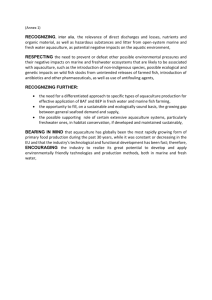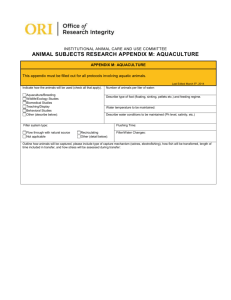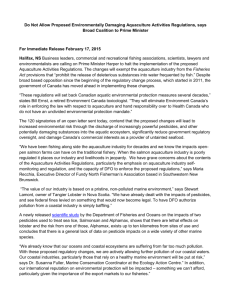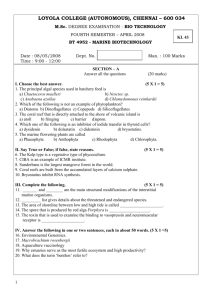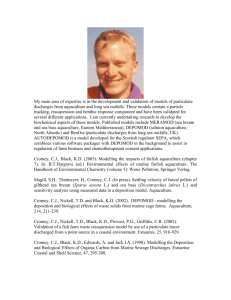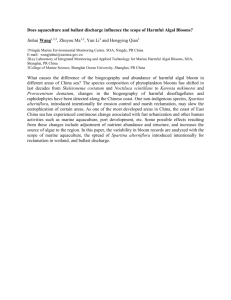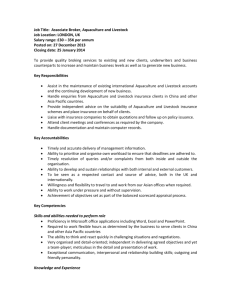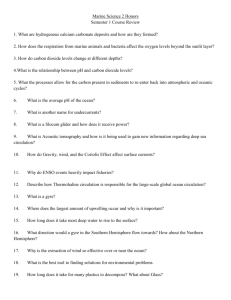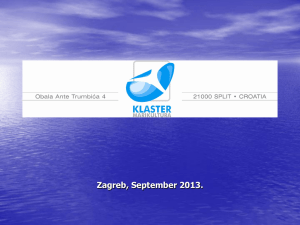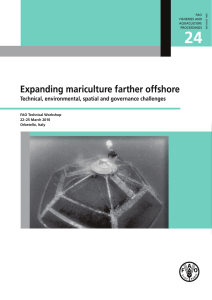Recent evolution of mariculture production in the worId :
advertisement
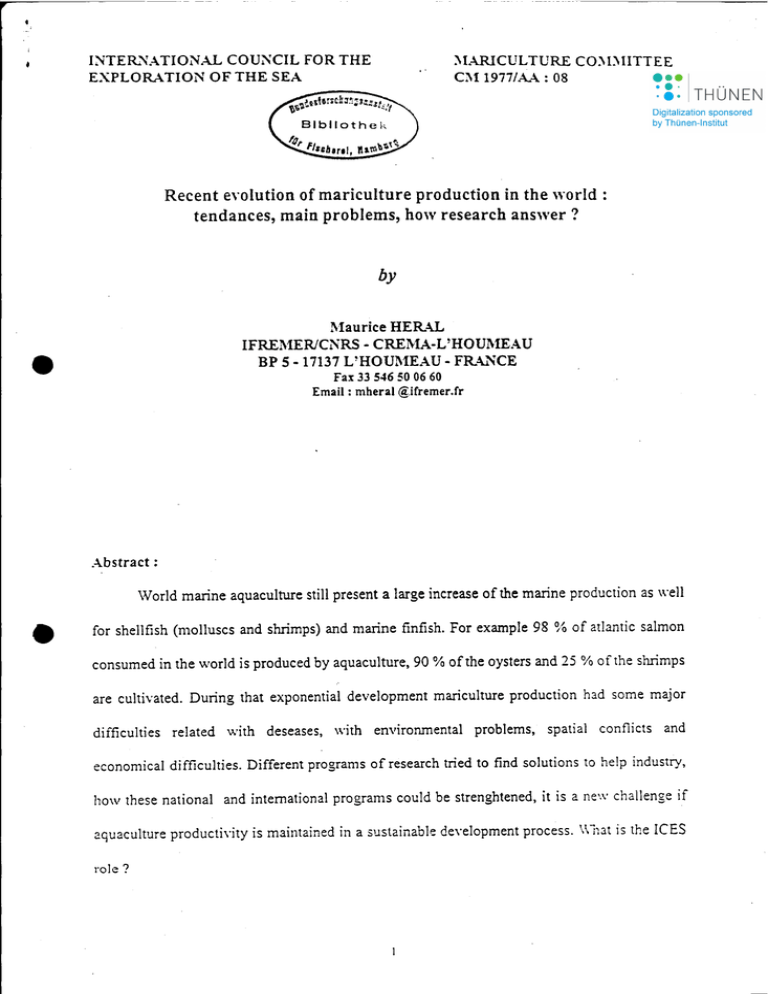
I~TERSATIONAL COU~CIL FOR THE :\IARlCULTURE CO:\DlITTEE EXPLORATION OF THE SEA Cl\11977/A...-\ : 08 Recent evolution of mariculture production in the worId : tendances, main problems, how research answer ? by Maurice HERU IFREMERlCNRS - CREMA-VHOUMEAU BP 5 - 17137 VHOUMEAU - FR~'1CE Fax 33 546 50 06 60 Email: mheral@ifremer.fr Abstract: World marine aquaculture still present a large increase of the marine production as weIl for shel1fish (molluses and shrimps) and marine finfish. For example 98 % of atlantic salmon consumed in the world is produced by aquaculture. 90 % ofthe oysters and 25 % ofthe shrimps are cultivated. During that exponential development mariculture production had some major difficulties related with deseases, with environmental problems. spatial conflicts and economical difficulties. Different programs of research tried to find solutions to help industry, how these national and international programs could be strenghtened, it is a ne\\' challenge if aquaculture producti\'ity is maintained in a sustainable de\'elopment process. \\113t is the leES roJe? 1994 World Aquaculture Production hy Quanlitics and Vlllues for Inland BIld Marine Waters (- --Ouantity in melri~t~=:J ·-----1 Marine o •• _. o. G _._----_.6.098.8~n Manne : 14.U31 ,496 L....:...._-..,,;.--J ----------.._-.. -.."' j . -- ,.... '-" r-~--\ '. ( 6i.oJ'~C-) Inland ./ ·------J c-._----_ ] Inland 1 2,456. 21 ~. • • ~ t ,.. ' .. t.. 10.699.317 . ... . _ .. - - - - - ..•.- - - - - - - - (55.0"8 --J ... Aquaculture production per group of species (1995) .. Fishes Molluscs Crustaceans Total 14,73 5,09 1,13 20,94 millions tons Aquaculture production in the different geographical areas 1995 Asia 18,27 ~farine ° OS America 0,92 Total 20,94 production per group ofspecies 1995 Fishes l'Iolluscs 5,08 1,·n • Europe 1,70 Africa Crustaceans 1,07 Total 7,56 Fish aquaculture production for marine species 1997 in millions tons Salmonide Lates 0,12 Mullet 0,15 0,71 l\Iilkfish 0,35 Various 0,08 Total 1,41 Source FAO E\'olution of aquaculture production bennen 1988 and 1994 1988 Total (1) fish Tons I 1 290000 14650000 520000 7600000 1988 Tons Total (1) fish Europe (*) World 1 520000 25410000 Europe (*) \Vorld (**) 730000 13050000 b~' group of species (2)crustacean (3) binl\'es (4) seaweed 3000 650000 760000 3000000 - 3400000 by environnement (a)fresh (b) marine water 350000 7350000 910000 7300000 by group of species (2)crustacean (3) binlves (4) seaweed by en\'ironnement (a)fresh (b) marine water 1500 1 070000 390000 11 150000 i80000 4390000 5000 6900000 1 100000 14160000 (**) (*) including Eastern Europe (except fonner l.:SSR) and Mediterranean Basin - source: European Commission, IFREMER, SIPAM net\\'ork, FAD ("'*) source FAO (3) bivalves include all musseIs from aquaculture, restocking on located areas or fisheries i . ". total '00 sc ....-,;t··t'~ Ge -0- ),. ~2 ~: aquaculture =0 • P,?", Evolution of aquaculture production and totallandings :251~-------------""" 20 ; '5 '0 I 'I 5 '1 i o, I --J "-i :934 ,seo ,S83 ,;s-o '?~2 '9S4 '9",~ Percentage of aquaculture production \'ersus fisheries Aquaculture Production of Shrimps byOuantily ..ncJ Valuc anti COIllJ}arisoo with Tolal Production, 1900·1994 Shrimps: TotaJ Production. 1900-1~94 Shrimps: Aqußculturc by Ouantity aud Valuc, 1900-1994 '"c: .2 ., ~ U ... 600 4,000 '1. c !iOO - o 'u . \: n.~ :J ... U) :J 11 E .. u C II 3000 4\.10 == ~ ~ CIl E "0 C ..,Q. :J o ~ 0 .....c 300 Year r.:---- -_. -_.-- _ ...._. _ ... - - - ' - J:: ~!':'~~~~l u Tot..! I~~duclion ; rr?oö;IÜ4:l!~6J l!2..Aqlla~~~rc - Aquaculture Production of Atlantic SaJmon aud COOtllarison wilh WiSd eelteh of Adanlic and Pac.ific Salmons for 1994 ALiantic Salmon: AquaC\JIturc by OUAIltity und VaJuc, '~)ß0·1994 AtJantic Salmon Pro<.!uclion, 1994 "---.. .1 400.000 350,000 300,000 I l -, u 200.000 -r. 1 'jO,OOO I ~ C' ~ ...'" I U) 0 t- ..• 1,000,000 .... 250.000 '"c 1.600.000 '<; ::J "0 C ...:J aJ o .c .... -- ..... -----_. - -.- ... -------- I _._---~ Pacific SaJmons Production, 1 ~H)4 ---_. __ ._-- -------------_. 100,000 .. 50,000 WIld Cat'~hJ 92.0% ,-----_ .•.... _ - - - - • ---.'-- ., Production of Atlantic and Pacific SalnlOnS lJy Aquaculturc afld Wild Catch. 1980-1994 AlIan\ic S<llmon P<lcific S<llmofls I· \. I. I· . I r - _._- - _._._- .'----, ILJ Wild ealeh I I i I . Aqll.JCllllurc IHlHJIJCllOnl I" T111.11 p:oII ••• :IIIIII t_·_:' .._. __ ._ ...._._.. ._. .' . ._. I [Eö.'~}~~J._.. Table 3 : Evolution of Atlantic salmon production in Europe (metric ton) ~orway Scotland Island and Feroe Isles Irlande France Spain TOTAL 1988 74000 16300 5500 4000 650 150 100800 1990 130000 30000 15700 6000 200 350 182250 1992 1993 1994 1995 130000 180000 210000 249000 36000 49000 54000 72 000 20200 17200 12200 13000 9700 12400 11 800 12500 200 240 450 500 800 600 900 1250 19690 25944 28935 348250 Table 4 Evolution of sea bass and sea breal11 production in the Euro-Mediterranean ara (metric tons). I 1988 1989 1990 1991 1992 1993 1994 1995 France Greece Haly Spain .,160- 800 600 1 600 8 800 5000 10000 13000 17800 1680 1950 1 900 2 500 2900 3500 4000 7600 90 365 590 1 090 1 750 2500 2700 3 170 ... -",;, 375 750 1 250 2350 3400 3650 Other countries 650 1475 1 850 2 850 4340 7340 9300 10000 • TOTAL 3380 4625 6 315 15990 15240 25690 32400 42 120 Sources SIPMI-IFREMER - Federation ofEuropean Aquaculture Producers. i I • ... -,. ..... .; • • '-..)J ......................................................................................................................................................................................................................... , ..........................•....•.......•............•................., I! I I i ! ! - -----------~ • - ..... 01 ~ -_ _. •• ~: , ' . ' _••_ ....... ... .,. • =::,: .. .. :: .. :: .. . . .. ~.~--------~~.~ ~ ::: j : .:: J: ~~~ ....•..••.•.••••.••.•.••••••••••••••.• , •..••..••••.•..••..•••••••••.•.•...•.•.•..... I '.:. :..,' :. ;.'.:. :.' ':. :...,'...:. :,. :. :',.:. .:,":.'. .:.;'.:...:.:.; . ...:. . : ;... ;. r~-"""''-;'' I . ::.): - "S9i i'roduction of oysters in tons (total \\'cight) l\IAIN PROGR.\l\IS OF RESEARCH 1) Control of biological cycles of cultivated species - physiology of reproduction, growth and adaptation - nutrition 2) Deseases - Defense mechanisms - identifiction of parasites - epidemiology - treatment, vaccination, antibiotics 3) Genetic - Cytogenetic : polyplofds, gynogenetic strain, monosex - genetic characterization of the species . - markers - populationlescape - hybridation - improvement and selection of strain - deseases resistant - growth rate - gene transfer 4) Optimisation of the production in relation with economical studies market problems 5) Environmental impact - Carrying capacity - Holding capacity - Biodiversity - \Vater treatment 6) Integrated coastal zone management - future place of mariculture racing with other industries • lCES INPUTS • Cooperation of scientists through : the Annual Science Conference the \Vorking groups the study group \Vorking group on environmental interaction of Mariculture H. Rosentlzal • \Vorking group on the application of genetics in fisheries and mariculture J. \Vorking group on marine fish culture B. Howel \Vorking group on introduction and transfert J. CarltolZ \Vorking group on pathology and diseases of marine organism AHJfc Vicar ~lfork . - the workshops: the workshop on shellfish bivalve cultivation, growth, modelling and impact on the ecosystem - the symposiums: Environmental effects of mariculture • advices to international agencies. through recommandations to ICES and to associated countries AC:\IE - Code of practice for introduction of non native species - Chemieals used by aquaculture - Gl\10 11 and .--------------------- - - ---- l\fariculture Committee Shellfish Committee International Council far the Exploration of the Sea _______ ICES CM 1997fF:L REPORT OF THE WORKSHOP ON SHELLFISH BIVALVE CULTIVATION, GROWTH, MODELLING AND IMPACT ON THE ECOSYSTEl\1 PLY1v10UTH U.K. 6-10 Oetober 1996 Convenors : M. HERAL *, B. BAYNE This report is not to be quoted without prior eonsultation with the General Secretary. The doeument is areport of an expert Group under the auspices of EU and the International Council for the Exploration of the Sea and does not necessarily represent the views of the Couneil and DG14. • IFRPvlER.'CNRS· CREMA·L·HOU~1EAU. BP 5.17137 L·HOUMEAU. FRAl"CE E-r:1ai) : mhe~:ll ~ifrcmcr.fr ,., ,- • INTER1'JATIONAL COUNCIL FOR EXPLOR.\TION OF THE SEA Symposium: Environmental effects of mariculture FIRST AJ.'\rr\OUNCEMENT Co-convenors : M. HERAL, D. \VILDISH St Andrews, N.B. Canada, 13-16 September 1999 Objectives and scopes ofthe Symposium Marine Aquaculture development is facing towards several environrnental problems which can limit its expansion if alternative management strategies are not found. The goal ofthe Symposium is to identify, describe and model the positive and negative impact of Mariculture to give an exact state of the art. The symposium is concerned as weH by the shellfish (mollüscs, crustacean) arid marine finfish. Sessions on the following subjects will be organized : - Genetic problems (escapes, GMO,...), - Introduction ofnon indigenous species, - Chemieals used in mariculture, - Organic wastes and depuration system, - Impacts on biodiversity, - Carrying capacity for shellfish, - Holding capacity for finfish, - Integrated coastal zone management and place ofmariculture. A steering committee will be nominated during the Baltimore Annual Science Conference to precise the topics and theorganisation ofthe Symposium. 13
